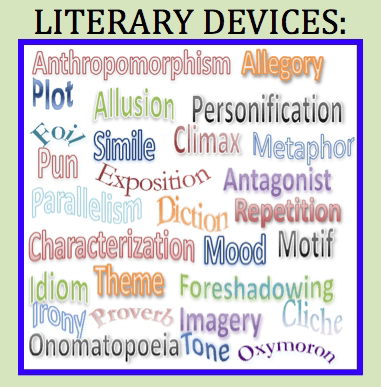10 Literary Terms that will promote your communication or writing skills
By Shalomupdatez
Save the post and read again and again for memorisation*
1. Cliché – An expression that has lost its freshness or appeal due to overuse.
Examples: the writing is on the wall, as easy as pie, what goes around comes around, or turn over a new leaf
2. Melodrama – A drama (play) which sets clearly “good guys” against obviously “bad guys” in scenes of
sensational action and suspense, but ends happily.
3. Meter – the sound a poem makes based on regular or irregular patterns of syllables and stresses in each
line. Meter is measured in ‘feet’ per line of a poem, and the lines are measured as ‘versification.’ Figuring
out a poem’s meter can be a bit tricky, but usually a pattern emerges after you ‘scan’ a few lines and mark
the stressed and unstressed syllables and add up the ‘feet,’ or stresses. These patterns (or ‘scansion’)
are assigned names such as “iambic pentameter,” which means each lines has five ‘iambs’ (one
unstressed + one stressed syllable) for a total of ten beats per line. Certain forms of poetry prescribe a
certain meter. Sonnets, for example, are usually iambic pentameter. It’s helpful to scan a poem for meter
for a few reasons. For one, meter can help you figure out the form of a poem, which can give you clues
about the writer and his or her historical, social or cultural context; this can help you ask questions about
the conventions and expectations of the poem. Additionally, meter can help you figure out the overall
‘sound’ of the poem and consider the pacing---how fast or how slow it moves and why. Further, meter
might complement imagery. For example, long deep-breathing lines followed by shorter lines might mimic
waves crashing on a beach and then receding.
4. Versification - Generally, the structural form of a verse, as revealed by scansion. Identification of verse
structure includes the name of the metrical type and the name designating number of feet:
•
Monometer: 1 foot
•
Dimeter: 2 feet
•
Trimeter: 3 feet
•
Tetrameter: 4 feet
•
Pentameter: 5 feet
•
Hexameter: 6 feet
•
Heptameter: 7 feet
•
Octameter: 8 feet
•
Nonameter: 9 feet
5. Elegy – A formal poem lamenting about the dead
6. Allusions imply reading and cultural experiences shared by the writer and the reader, functioning as a kind
of shorthand whereby the recalling of something outside the text supplies an emotional or intellectual
context. Use the verb form, allude.
Example: At the outset of his “I Have a Dream” speech, Martin Luther King, Jr. says, “Five score
years ago,” an allusion to Lincoln’s “Gettysburg Address,” which begins “Four score and seven
years ago.” King alludes to Lincoln in order to draw a parallel between the historic moment of
emancipation and his own time during the Civil Rights Movement.
7. Foot – the basic unit of rhythm in poetry consisting of a group of two or three syllables. For example, a
line of poetry ten syllables long written in iambs (an unstressed syllable followed by a stressed syllable)
would be iambic pentameter. Note that variation is important in poetry; therefore, the prevailing foot may
be spotted with different feet. A line of iambic poetry may begin with a trochee.
Types of feet: U (unstressed); / (stressed)
Iamb: U /
Trochee: / U
Anapest: U U /
Dactyl: / U U
Spondee: / /
Pyrrhic: U U
8. Conceit – a figure of speech (such as an analogy, metaphor, hyperbole, or oxymoron) which sets up
an unusual, exaggerated, or elaborate parallel between two different things (for example, comparing one’s
beloved to a ship or planet. The comparison may be brief or may extend throughout an entire poem.
Example: In “Valediction: Forbidding Mourning” John Donne includes an extended metaphor
comparing the souls of himself and his lover to a drafting compass: “If they be two, they are two
so / As stiff twin compasses are two;” The poem continues to build on this image until its
conclusion.
9. Free Verse – flowing lines, usually unrhymed, that vary in length and with no fixed meter.
10. Enjambment– when a sentence ‘steps over’ a line break into the next line without pause.
For more tips visit fifipediaacademy on Facebook, shalomuodatez on facebooks, and our WhatsApp tv


Comments
Post a Comment